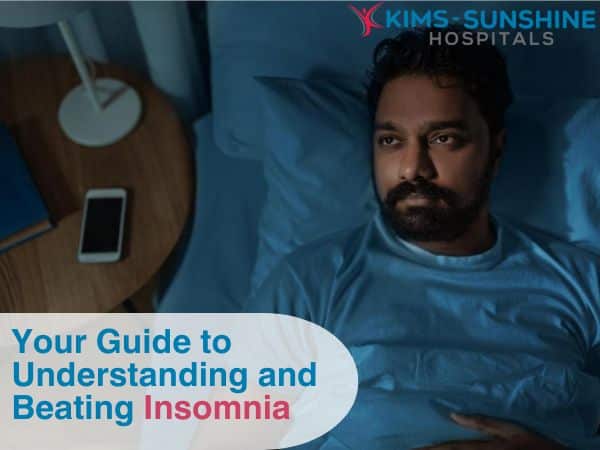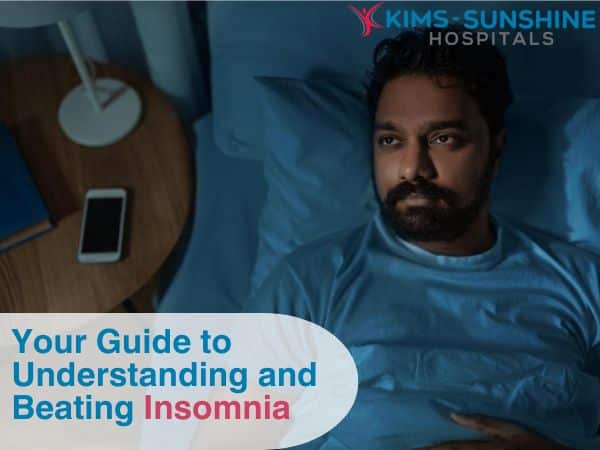
Your Guide to Understanding and Beating Insomnia

You’re lying there, staring at the ceiling, watching the minutes tick by. Your mind is racing through tomorrow’s to-do list, that embarrassing thing you said in college and someother random thing. Sound familiar? Welcome to the Insomnia Club!
The Science Behind Your Sleepless Nights
Your sleep system is like a sophisticated piece of technology – except instead of “turn it off and on again,” you’re dealing with a complex interplay of:
- Circadian rhythms (your internal clock)
- Hormones (cortisol and melatonin playing tag)
- Neurotransmitters (your brain’s chemical messaging system)
Common Culprits Behind Your Sleepless Nights
1. The Stress Monster
- Work pressure.
- Financial concerns.
- Relationship issues.
- That thing your boss said that you’re definitely overthinking.
2. Lifestyle Choices That Sabotage Sleep
- Caffeine after 2 PM.
- Irregular sleep schedules.
- Evening screen time.
- Late-night snacking adventures.
3. Environmental Factors
- Noisy neighbors.
- Temperature issues.
- Light pollution.
- That one squeaky floorboard.
Why Poor Sleep Is More Than Just Feeling Tired:
1. Physical Impact
- Weakened immune system.
- Increased risk of weight gain.
- Higher blood pressure.
2. Mental Health Effects
- Reduced concentration.
- Memory problems.
- Mood swings.
- Anxiety and depression risks.
Your Action Plan – Breaking Free from Insomnia
Master Your Sleep Hygiene Game
Create a Sleep Sanctuary:
- Keep your bedroom cool.
- Invest in blackout curtains.
- Use white noise if needed.
- Make your bed inviting.
Establish a Bedtime Routine:
- Set a consistent sleep schedule.
- Create a wind-down ritual.
- Practice relaxation techniques.
- Avoid screens before bed.
2. Lifestyle Changes That Actually Work
During the Day:
- Exercise (but not too close to bedtime).
- Get natural sunlight exposure.
- Manage stress through meditation or yoga.
- Stay active but don’t overdo it.
2. Watch What You Consume:
- Cut off caffeine by 2 PM.
- Avoid heavy meals before bed.
- Limit alcohol (it might make you sleepy but disrupts deep sleep).
- Stay hydrated (but not right before bed).
3. Natural Remedies Worth Trying
Herbal Helpers:
- Chamomile tea.
- Valerian root.
- Lavender (in tea or essential oil form).
- Magnesium supplements.
4. Mind-Body Techniques:
- Progressive muscle relaxation.
- Deep breathing exercises.
- Guided imagery.
- Mindfulness meditation.
When to Seek Professional Help
Red Flags That Warrant a Doctor’s Visit:
- Insomnia lasting more than a month.
- Daytime functioning severely affected.
- Signs of sleep apnea.
- Depression or anxiety symptoms.
- When sleep deprivation affects your safety.
Advanced Strategies for Persistent Insomnia
Cognitive Behavioral Therapy for Insomnia (CBT-I)
- Addresses thought patterns affecting sleep.
- Helps break negative sleep associations.
- Provides structured sleep restriction therapy.
- Teaches long-term coping strategies.
Sleep Restriction Therapy
- Temporarily limits time in bed.
- Builds up sleep pressure.
- Resets sleep patterns.
- Improves sleep efficiency.
Stimulus Control Therapy
- Use bed only for sleep and intimacy.
- Get up if you can’t sleep after 20 minutes.
- Return only when sleepy.
- Maintain consistent wake times.
The Role of Technology in Sleep Management
Helpful Tech:
- Sleep tracking apps.
- White noise machines.
- Smart lighting systems.
- Temperature-regulating bedding.
Tech to Avoid:
- Blue light-emitting devices.
- Stimulating content before bed.
- Work-related notifications.
- Social media scrolling.
Creating a Sustainable Sleep Strategy
Daily Sleep-Supporting Habits:
Morning Routine:
- Fixed wake time.
- Morning light exposure.
- Energizing breakfast.
- Gentle exercise.
Daytime Practices:
- Regular exercise.
- Stress management.
- Proper nutrition.
- Caffeine awareness.
Evening Wind-Down:
- Relaxation routine.
- Light stretching.
- Mindful reflection.
- Gratitude practice.
A Final Note on Sleep Success
Remember: Good sleep is a skill and like any skill, it takes practice. Don’t get discouraged if you don’t see immediate results. Focus on consistency and finding what works for your unique situation.
Disclaimer: This article is for informational purposes only and should not replace professional medical advice. If you’re experiencing chronic insomnia, please consult with a doctor for personalised guidance.
Frequently Asked Questions
1. What are the most common causes of insomnia?
Psychological Factors:
- Stress and anxiety.
- Depression.
- Racing thoughts.
- Trauma or PTSD.
Physical Causes:
- Hormonal changes.
- Chronic pain.
- Medical conditions.
- Medications.
Lifestyle Factors:
- Irregular sleep schedule.
- Excessive caffeine use.
- Poor sleep environment.
- Screen time before bed.
Environmental Issues:
- Noise disruption.
- Uncomfortable temperature.
- Too much light.
- Poor air quality.
2. How can stress and anxiety lead to insomnia?
The Stress-Sleep Cycle:
- Stress triggers the “fight or flight” response.
- Your body produces stress hormones (cortisol and adrenaline).
- These hormones keep you alert and ready for action.
- Your mind races with worried thoughts.
- Sleep becomes difficult to achieve.
How It Manifests:
- Difficulty falling asleep.
- Waking up frequently.
- Early morning awakening.
- Unrefreshing sleep.
Breaking the Cycle:
- Practice stress management techniques.
- Establish a wind-down routine.
- Consider therapy or counseling.
- Learn relaxation techniques.
- Address underlying anxiety causes.
3. What are the symptoms of chronic insomnia and when should you seek help?
CBT is particularly effective for unexplained depression because it focuses on the present rather than requiring a specific trigger to address. Here’s how it helps:
Key Symptoms:
- Difficulty falling asleep (taking >30 minutes).
- Frequent night wakings.
- Early morning awakening.
- Daytime fatigue.
- Mood changes.
- Concentration problems.
- Memory issues.
Seek Professional Help When:
1. Duration:
- Insomnia persists >3 nights per week.
- Problems last >3 months.
2. Impact on Daily Life:
- Work performance suffers.
- Relationship problems emerge.
- Risk of accidents increases.
- Mental health deteriorates.
3. Additional Symptoms:
- Depression develops.
- Anxiety becomes severe.
- Physical health problems arise.
4. What are some natural remedies for treating insomnia?
Natural remedies can be effective first-line treatments for many people:
Herbal Remedies:
1. Chamomile:
- How: Tea or supplement.
- When: 30-60 minutes before bed.
- Why: Contains apigenin, promoting sleepiness.
2. Valerian Root:
- How: Supplement or tea.
- When: 1-2 hours before bed.
- Why: May increase GABA levels.
Lavender:
- How: Essential oil or tea.
- When: During bedtime routine.
- Why: Calming aromatherapy effects.
Supplements:
- Magnesium.
- Melatonin.
- L-theanine.
- Glycine.
Mind-Body Practices:
- Meditation.
- Deep breathing exercises.
- Progressive muscle relaxation.
- Yoga nidra.
Important: Always consult healthcare providers before starting any supplements.
5. What lifestyle changes can improve sleep quality for people with insomnia?
Daily Habits:
1. Sleep Schedule:
- Consistent bedtime.
- Regular wake time.
- No weekend sleep marathons.
2. Exercise:
- Regular physical activity.
- Morning or early afternoon.
- Avoid vigorous exercise near bedtime.
3. Diet and Nutrition:
- Limit caffeine after 2 PM.
- Avoid heavy evening meals.
- Stay hydrated during the day.
- Consider sleep-supporting foods.
Evening Routine:
1. Light Management:
- Reduce blue light exposure.
- Use warm lighting.
- Consider blackout curtains.
2. Temperature Control:
- Keep bedroom cool (65-68°F/18-20°C).
- Use appropriate bedding.
- Consider a fan or AC.
3. Relaxation Practices:
- Create a pre-sleep routine.
- Practice calming activities.
- Limit screen time.
- Use relaxation techniques.
Environmental Changes:
-
- Comfortable mattress and pillows.
- Clean, clutter-free bedroom.
- White noise machine if needed.
- Air quality management.
Remember: Consistency is key – stick with changes for at least 2-3 weeks to see results.

Dr. Devika Kosana
MBBS, MD Psychiatry (AIIMS, New Delhi)
Consultant Psychiatrist
Subscribe to our Newsletter






